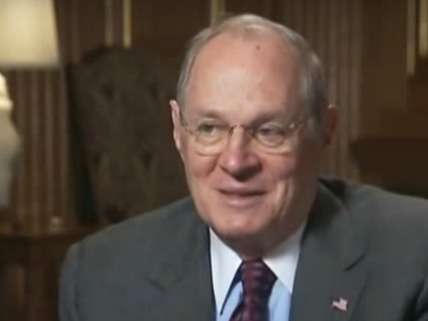Kennedy's Departure Probably Will Give Us a Court More Inclined to Defend Gun Rights
The retiring justice seems to have been a crucial obstacle to hearing Second Amendment cases.

Although Anthony Kennedy joined all three decisions in which the Supreme Court has upheld the constitutional right to keep and bear arms, his retirement probably means the Court will be less reluctant to define the contours of that right. In the decade since the Court first ruled that a law was inconsistent with the Second Amendment, it has passed up almost every opportunity to resolve lingering questions about which forms of gun control are constitutional. It seems clear that Kennedy bears much of the responsibility for that reticence.
It takes four votes to grant Supreme Court review. Two justices, Clarence Thomas and Neil Gorsuch, are on record as criticizing the Court's neglect of the Second Amendment. On three occasions, Thomas has written dissents arguing that the Court should have agreed to hear a challenge to a gun control law. Last year, in a case involving California's prohibitive restrictions on carrying guns in public, Gorsuch added his name to one those dissents.
While Samuel Alito did not join any of those dissents, he seems to favor a more aggressive defense of the right to arms recognized in District of Columbia v. Heller, the landmark 2008 decision that overturned a handgun ban in the nation's capital. Alito wrote the majority opinion in the 2010 case McDonald v. Chicago, which overturned that city's handgun ban and confirmed that "the Second Amendment right is fully applicable to the States." Chicago "ask[s] us to treat the right recognized in Heller as a second-class right, subject to an entirely different body of rules than the other Bill of Rights guarantees that we have held to be incorporated into the Due Process Claus," Alito observed in that case. Thomas argues that his colleagues have in effect been doing what Chicago wanted them to do: treating the right to armed self-defense as a second-class right, "this Court's constitutional orphan." Alito's concurring opinion in Caetano v. Massachusetts, a 2016 case involving a state ban on stun guns, suggests he is sympathetic to that view.
The Supreme Judicial Court of Massachusetts had upheld the stun gun ban based on the mistaken premise that weapons are covered by the Second Amendment only if they are appropriate for military use and were familiar to Americans in 1791. That assumption was plainly inconsistent with Heller, and the Supreme Court said so in a brief per curiam opinion that stopped short of overturning the law (a step the Massachusetts court ultimately took two years later). Alito's concurring opinion, which Thomas joined, faulted his colleagues for their "grudging" decision and eloquently sympathized with Jaime Caetano, the woman who challenged the stun gun ban after she was convicted of violating it.
Caetano bought a stun gun to defend herself against an abusive boyfriend and brandished it in a confrontation that might otherwise have ended in serious injury or death. "Under Massachusetts law," Alito observed, "Caetano's mere possession of the stun gun that may have saved her life made her a criminal….If the fundamental right of self-defense does not protect Caetano, then the safety of all Americans is left to the mercy of state authorities who may be more concerned about disarming the people than about keeping them safe."
It seems reasonable to assume that Alito is not one of the justices who is stopping the Court from hearing Second Amendment cases. That leaves Chief Justice John Roberts and Kennedy, both of whom joined the majority in Heller and McDonald but seem disinclined to address important issues those decisions left unresolved, including the right to bear arms outside the home, the constitutionality of bans on particular kinds of firearms (such as "assault weapons"), and the appropriate level of scrutiny for gun control laws.
Given Donald Trump's avowed intent to pick a replacement for Kennedy from a list of candidates favored by conservatives and the president's commitment to defending the Second Amendment (which he views as politically important even if he does not really care much about it), his nominee probably will be more inclined than Kennedy to take on these questions. Assuming Alito also wants to hear more Second Amendment cases, Kennedy's replacement would provide a crucial fourth vote to review decisions upholding gun control laws, forcing Roberts to take sides on controversies he seems keen to avoid.
[This post has been revised to correct the timing of the decision that overturned the Massachusetts ban on stun guns, which did not happen until last April.]


Show Comments (50)